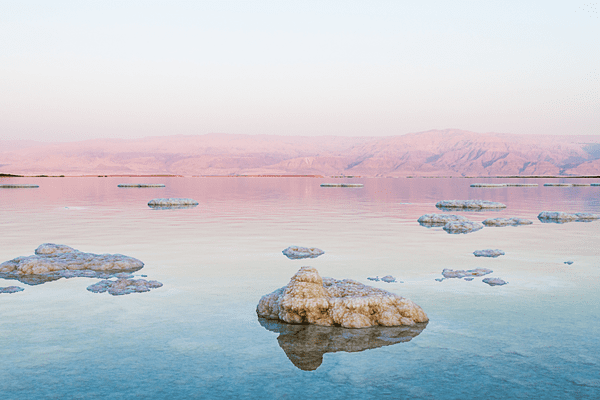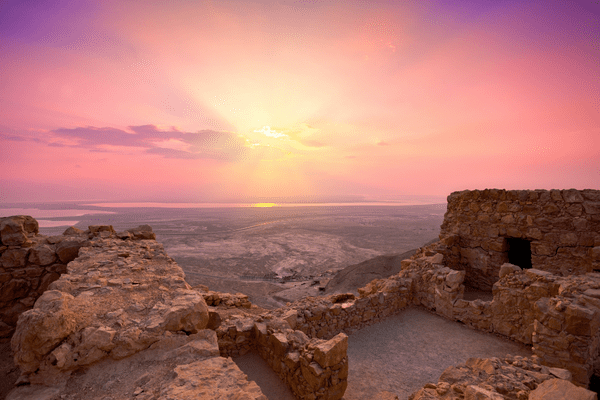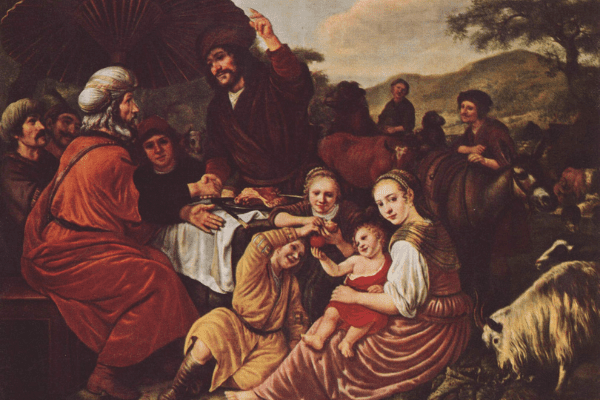
TORAH
NEVI'IM
KETUVIM
Chapter 2
Translation and Transliteration of
Listen to this chapter in Hebrew:
- Commentary
- Buy E-book
- Buy the Israel Bible
1A certain man of the house of Levi went and married a Levite woman.
אוַיֵּלֶךְ אִישׁ מִבֵּית לֵוִי וַיִּקַּח אֶת־בַּת־לֵוִי׃
2The woman conceived and bore a son; and when she saw how beautiful he was, she hid him for three months.
בוַתַּהַר הָאִשָּׁה וַתֵּלֶד בֵּן וַתֵּרֶא אֹתוֹ כִּי־טוֹב הוּא וַתִּצְפְּנֵהוּ שְׁלֹשָׁה יְרָחִים׃
3When she could hide him no longer, she got a wicker basket for him and caulked it with bitumen and pitch. She put the child into it and placed it among the reeds by the bank of the Nile.
גוְלֹא־יָכְלָה עוֹד הַצְּפִינוֹ וַתִּקַּח־לוֹ תֵּבַת גֹּמֶא וַתַּחְמְרָה בַחֵמָר וּבַזָּפֶת וַתָּשֶׂם בָּהּ אֶת־הַיֶּלֶד וַתָּשֶׂם בַּסּוּף עַל־שְׂפַת הַיְאֹר׃
4And his sister stationed herself at a distance, to learn what would befall him.
דוַתֵּתַצַּב אֲחֹתוֹ מֵרָחֹק לְדֵעָה מַה־יֵּעָשֶׂה לוֹ׃
5The daughter of Pharaoh came down to bathe in the Nile, while her maidens walked along the Nile. She spied the basket among the reeds and sent her slave girl to fetch it.
הוַתֵּרֶד בַּת־פַּרְעֹה לִרְחֹץ עַל־הַיְאֹר וְנַעֲרֹתֶיהָ הֹלְכֹת עַל־יַד הַיְאֹר וַתֵּרֶא אֶת־הַתֵּבָה בְּתוֹךְ הַסּוּף וַתִּשְׁלַח אֶת־אֲמָתָהּ וַתִּקָּחֶהָ
6When she opened it, she saw that it was a child, a boy crying. She took pity on it and said, “This must be a Hebrew child.”
ווַתִּפְתַּח וַתִּרְאֵהוּ אֶת־הַיֶּלֶד וְהִנֵּה־נַעַר בֹּכֶה וַתַּחְמֹל עָלָיו וַתֹּאמֶר מִיַּלְדֵי הָעִבְרִים זֶה׃
7Then his sister said to Pharaoh's daughter, “Shall I go and get you a Hebrew nurse to suckle the child for you?”
זוַתֹּאמֶר אֲחֹתוֹ אֶל־בַּת־פַּרְעֹה הַאֵלֵךְ וְקָרָאתִי לָךְ אִשָּׁה מֵינֶקֶת מִן הָעִבְרִיֹּת וְתֵינִק לָךְ אֶת־הַיָּלֶד׃
8And Pharaoh's daughter answered, “Yes.” So the girl went and called the child's mother.
חוַתֹּאמֶר־לָהּ בַּת־פַּרְעֹה לֵכִי וַתֵּלֶךְ הָעַלְמָה וַתִּקְרָא אֶת־אֵם הַיָּלֶד׃
9And Pharaoh's daughter said to her, “Take this child and nurse it for me, and I will pay your wages.” So the woman took the child and nursed it.
טוַתֹּאמֶר לָהּ בַּת־פַּרְעֹה הֵילִיכִי אֶת־הַיֶּלֶד הַזֶּה וְהֵינִקִהוּ לִי וַאֲנִי אֶתֵּן אֶת־שְׂכָרֵךְ וַתִּקַּח הָאִשָּׁה הַיֶּלֶד וַתְּנִיקֵהוּ׃
10When the child grew up, she brought him to Pharaoh's daughter, who made him her son. She named him Moshe, explaining, “I drew him out of the water.”
va-yig-DAL ha-YE-led va-t'-vi-AY-hu l'-vat par-OH vai-hee LAH l'-VAYN va-tik-RA sh'-MO mo-SHEH va-TO-mer KEE min ha-MA-yim m'-shee-TI-hu
יוַיִגְדַּל הַיֶּלֶד וַתְּבִאֵהוּ לְבַת־פַּרְעֹה וַיְהִי־לָהּ לְבֵן וַתִּקְרָא שְׁמוֹ מֹשֶׁה וַתֹּאמֶר כִּי מִן־הַמַּיִם מְשִׁיתִהוּ׃
![]() 2:10 She named him Moshe
2:10 She named him Moshe
Moshe was the greatest of all of Israel’s leaders, who is known with affection in Jewish tradition as Moshe Rabbeinu (משה רבינו), ‘Moshe our Teacher.’ Although Moshe speaks directly with Hashem, he is identified as the most humble person to ever live (Numbers 12:3). The name Moshe is a constant reminder of his modest origins. According to the Sages of the Midrash, Moshe actually had ten names, but out of appreciation to Pharaoh’s daughter who saved him, he is referred to by the name she gave him: Moshe, which means ‘I have drawn him from the water.’
11Some time after that, when Moshe had grown up, he went out to his kinsfolk and witnessed their labors. He saw an Egyptian beating a Hebrew, one of his kinsmen.
יאוַיְהִי בַּיָּמִים הָהֵם וַיִּגְדַּל מֹשֶׁה וַיֵּצֵא אֶל־אֶחָיו וַיַּרְא בְּסִבְלֹתָם וַיַּרְא אִישׁ מִצְרִי מַכֶּה אִישׁ־עִבְרִי מֵאֶחָיו׃
12He turned this way and that and, seeing no one about, he struck down the Egyptian and hid him in the sand.
יבוַיִּפֶן כֹּה וָכֹה וַיַּרְא כִּי אֵין אִישׁ וַיַּךְ אֶת־הַמִּצְרִי וַיִּטְמְנֵהוּ בַּחוֹל׃
13When he went out the next day, he found two Hebrews fighting; so he said to the offender, “Why do you strike your fellow?”
יגוַיֵּצֵא בַּיּוֹם הַשֵּׁנִי וְהִנֵּה שְׁנֵי־אֲנָשִׁים עִבְרִים נִצִּים וַיֹּאמֶר לָרָשָׁע לָמָּה תַכֶּה רֵעֶךָ׃
14He retorted, “Who made you chief and ruler over us? Do you mean to kill me as you killed the Egyptian?” Moshe was frightened, and thought: Then the matter is known!
ידוַיֹּאמֶר מִי שָׂמְךָ לְאִישׁ שַׂר וְשֹׁפֵט עָלֵינוּ הַלְהָרְגֵנִי אַתָּה אֹמֵר כַּאֲשֶׁר הָרַגְתָּ אֶת־הַמִּצְרִי וַיִּירָא מֹשֶׁה וַיֹּאמַר אָכֵן נוֹדַע הַדָּבָר׃
15When Pharaoh learned of the matter, he sought to kill Moshe; but Moshe fled from Pharaoh. He arrived in the land of Midian, and sat down beside a well.
טווַיִּשְׁמַע פַּרְעֹה אֶת־הַדָּבָר הַזֶּה וַיְבַקֵּשׁ לַהֲרֹג אֶת־מֹשֶׁה וַיִּבְרַח מֹשֶׁה מִפְּנֵי פַרְעֹה וַיֵּשֶׁב בְּאֶרֶץ־מִדְיָן וַיֵּשֶׁב עַל־הַבְּאֵר׃
16Now the priest of Midian had seven daughters. They came to draw water, and filled the troughs to water their father's flock;
טזוּלְכֹהֵן מִדְיָן שֶׁבַע בָּנוֹת וַתָּבֹאנָה וַתִּדְלֶנָה וַתְּמַלֶּאנָה אֶת־הָרְהָטִים לְהַשְׁקוֹת צֹאן אֲבִיהֶן׃
17but shepherds came and drove them off. Moshe rose to their defense, and he watered their flock.
יזוַיָּבֹאוּ הָרֹעִים וַיְגָרְשׁוּם וַיָּקָם מֹשֶׁה וַיּוֹשִׁעָן וַיַּשְׁקְ אֶת־צֹאנָם׃
18When they returned to their father Reuel, he said, “How is it that you have come back so soon today?”
יחוַתָּבֹאנָה אֶל־רְעוּאֵל אֲבִיהֶן וַיֹּאמֶר מַדּוּעַ מִהַרְתֶּן בֹּא הַיּוֹם׃
19They answered, “An Egyptian rescued us from the shepherds; he even drew water for us and watered the flock.”
va-to-MAR-na ish mitz-RI hi-tzi-LA-nu mi-YAD ha-RO-eem v'-GAM da-LO LA-nu va-YASHK et ha-TZON
יטוַתֹּאמַרְןָ אִישׁ מִצְרִי הִצִּילָנוּ מִיַּד הָרֹעִים וְגַם־דָּלֹה דָלָה לָנוּ וַיַּשְׁקְ אֶת־הַצֹּאן׃
![]() 2:19 An Egyptian rescued us from the shepherds
2:19 An Egyptian rescued us from the shepherds
Based on this verse, the Sages of the Midrash contrast Yosef and Moshe. Yosef identified himself with Eretz Yisrael, as he says, “I was kidnapped from the land of the Hebrews” (Genesis 40:15), whereas Moshe does not protest when Jethro’s daughters refer to him as an Egyptian. Yosef therefore merits to be buried in the Land of Israel, while Moshe does not. Rabbi Zalman Sorotzkin points out that Moshe’s behavior is understandable, as he was not born in Israel nor had he ever been there. However, once Hashem had promised Avraham that his descendants would inherit the land, it became their homeland. No matter where in the world a Jew may find himself, he is called upon to identify with Eretz Yisrael.
20He said to his daughters, “Where is he then? Why did you leave the man? Ask him in to break bread.”
כוַיֹּאמֶר אֶל־בְּנֹתָיו וְאַיּוֹ לָמָּה זֶּה עֲזַבְתֶּן אֶת־הָאִישׁ קִרְאֶן לוֹ וְיֹאכַל לָחֶם׃
21Moshe consented to stay with the man, and he gave Moshe his daughter Tzipora as wife.
כאוַיּוֹאֶל מֹשֶׁה לָשֶׁבֶת אֶת־הָאִישׁ וַיִּתֵּן אֶת־צִפֹּרָה בִתּוֹ לְמֹשֶׁה׃
22She bore a son whom he named Gershom, for he said, “I have been a stranger in a foreign land.”
כבוַתֵּלֶד בֵּן וַיִּקְרָא אֶת־שְׁמוֹ גֵּרְשֹׁם כִּי אָמַר גֵּר הָיִיתִי בְּאֶרֶץ נָכְרִיָּה׃
23A long time after that, the king of Egypt died. The Israelites were groaning under the bondage and cried out; and their cry for help from the bondage rose up to Hashem.
כגוַיְהִי בַיָּמִים הָרַבִּים הָהֵם וַיָּמָת מֶלֶךְ מִצְרַיִם וַיֵּאָנְחוּ בְנֵי־יִשְׂרָאֵל מִן־הָעֲבֹדָה וַיִּזְעָקוּ וַתַּעַל שַׁוְעָתָם אֶל־הָאֱלֹהִים מִן־הָעֲבֹדָה׃
24Hashem heard their moaning, and Hashem remembered His covenant with Avraham and Yitzchak and Yaakov.
כדוַיִּשְׁמַע אֱלֹהִים אֶת־נַאֲקָתָם וַיִּזְכֹּר אֱלֹהִים אֶת־בְּרִיתוֹ אֶת־אַבְרָהָם אֶת־יִצְחָק וְאֶת־יַעֲקֹב׃
25Hashem looked upon the Israelites, and Hashem took notice of them.
כהוַיַּרְא אֱלֹהִים אֶת־בְּנֵי יִשְׂרָאֵל וַיֵּדַע אֱלֹהִים׃








